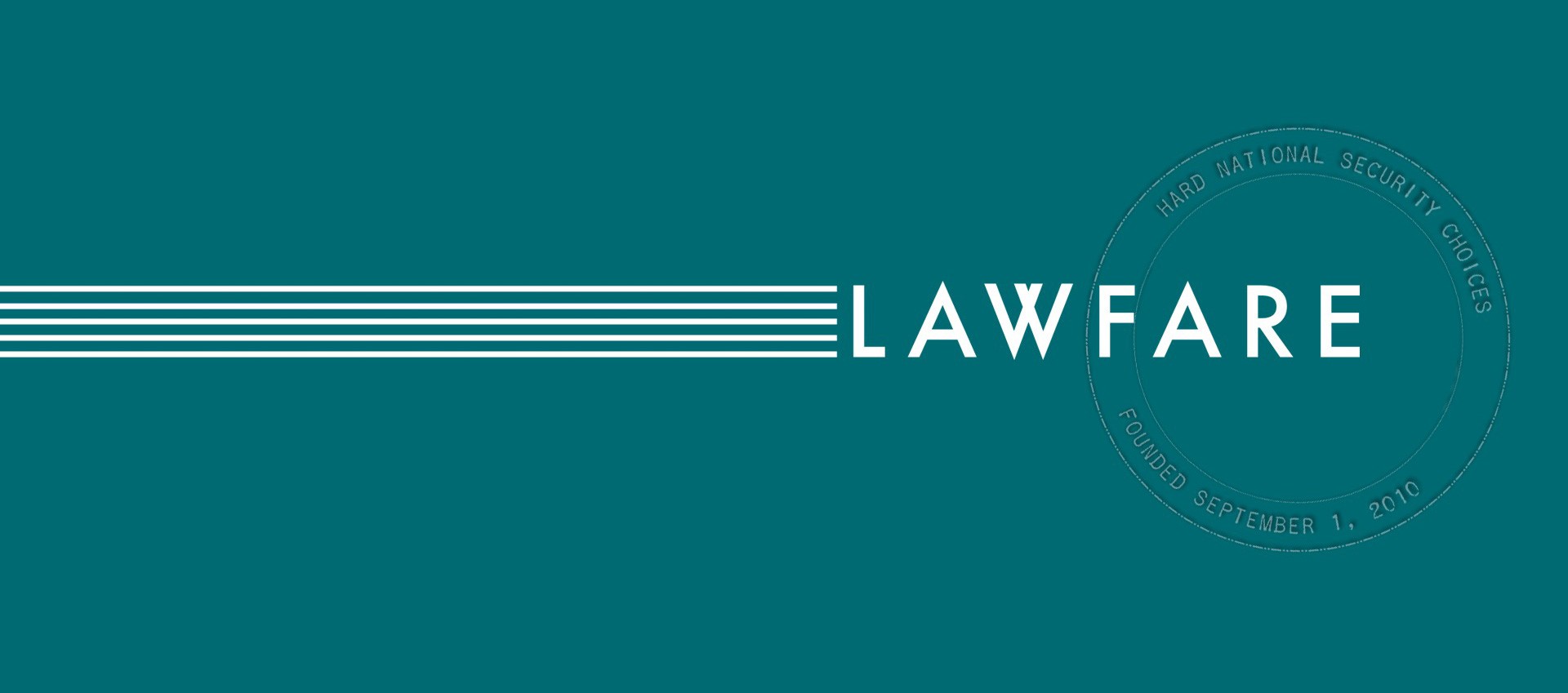The Week That Was: All of Lawfare in One Post

Published by The Lawfare Institute
in Cooperation With

Natalie K. Orpett discussed the multiple concurrent civil and criminal trials of former President Donald Trump–all happening amid his campaign for reelection—and considered how all of them are supposed to unfold at the same time.
Daniel Richman discussed whether Federal Rule of Criminal Procedure 43 and its interpretation in preceding cases require former President Donald Trump’s presence at the trials for each of the indictments against him. He concluded that it remains unclear whether Trump has a “right” to take time off from a trial.
On the Lawfare Podcast, Orpett sat down with Richman to discuss the complicated question of whether former President Donald Trump has to attend all of the trials in the cases against him while he is also running for president:
Benjamin Wittes was joined by Orpett, Quinta Jurecic, Saraphin Dhanani, and Scott Anderson for the first episode of Lawfare Live: Trump's Trials and Tribulations. They discussed the civil and criminal indictments against the former president, this week’s developments in the cases against him, and more:
Roger Parloff discussed previous cases heard in the D.C. Circuit that likely make any venue change sought by former President Donald Trump—in the case of his recent four-count federal indictment in Washington, D.C—unlikely to succeed.
Anna Hickey shared former President Donald Trump’s response to the government’s request for a protective order in the case regarding his alleged mishandling of classified information at Mar-a-Lago. The response requests that Trump be permitted to review evidence including classified material in locations other than designated SCIFs.
Hickey also shared the government's reply in support of its motion for a protective order in Special Counsel Jack Smith’s case against Trump for his alleged attempts to undermine the 2020 election results.
Katherine Pompilio shared Trump’s response in opposition to the government’s protective order governing discovery in the case regarding the former president’s alleged attempts to undermine the results of the 2020 election.
Pompilio also shared a U.S. Court of Appeals for the District of Columbia Circuit opinion affirming the district court’s decision to hold Twitter in contempt and impose a $350,000 fine for failing to produce records associated with Trump’s Twitter account in a timely manner.
On Rational Security, Anderson, Jurecic, and Alan Z. Rozenshtein sat down to discuss the week’s big national security news stories, including the possible implications of the coup in Niger for the future of the Sahel region, the different approaches of the two judges presiding over Trump’s criminal indictments, the bipartisan Kids Online Safety Act, and more:
Hickey shared a livestream of Attorney General Merrick Garland’s 12:15 p.m. ET press statement in which he announced the appointment of a special counsel to investigate allegations of criminal conduct by Hunter Biden, among others.
On Chatter, Wittes sat down with Katie Benner to discuss her experience covering the Justice Department for the New York Times during and after the Trump administration, how the department has changed, and more:
In an installment of Lawfare’s Digital Social Contract paper series, Asaf Lubin discussed the Commercial Spyware Accreditation System, a new binding, multi-stakeholder framework to regulate commercial spyware that he designed to overcome the limitations of traditional legal and policy tools.
On the Lawfare Podcast, Rozenshtein sat down with Lubin to discuss his Digital Social Contract paper, and why current efforts to control spyware are insufficient:
Zachary Arnold and Micah Musser discussed how procedural gaps have prevented existing laws from being used most effectively for AI regulation. They argued that a heavier focus on laws’ procedure and structure will allow both better utilization of existing laws and the design of more impactful new laws to regulate AI.
Cameron Kerry discussed the newly finalized EU-U.S. Data Privacy Framework and previewed the issues that will likely come up in the Court of Justice of the European Union’s upcoming review of the European Commission’s “adequacy” decision regarding the framework.
Justin Sherman discussed the shortcomings and implications of an amendment to the 2024 National Defense Authorization Act that includes data privacy protections from some data brokers and businesses for members of Congress, their families, and their staff but not their constituents.
On the Lawfare Podcast, Wittes sat down with Rose Jackson and Camille François to discuss the Atlantic Council’s Task Force for a Trustworthy Future Web. They covered the task force’s creation, trust and safety knowledge produced from diverse sectors, and how new ecosystems create future trust and safety challenges:
Timothy R. Heath analyzed Chinese President Xi Jinping’s discussion of the China Dream, arguing that it demonstrates strategic guidance to emerging crises focused on consolidating Chinese Communist Party rule, strengthening national security, managing risk, and incrementally expanding the country’s influence.
In this week’s installment of Lawfare’s Foreign Policy Essay series, Collin Meisel, Caleb Petry, Jonathan D. Moyer, and Mathew J. Burrows analyzed geopolitical influence capacity forecasts across four scenarios of the war in Ukraine. They predicted that the war will delay China’s ability to catch up to U.S. influence capacity and significantly diminish Russia’s global influence capacity.
On the Lawfare Podcast, Gia Kokotakis sat down with Jon Lewis and Meghan Conroy to discuss the role of far-right extremists in rising anti-LGBTQ+ violence. They covered far-right extremist groups’ history of anti-LGBTQ+ violence, what may have caused a spike in violence against the queer community, and how the extremist groups committing these acts of violence differ from traditional conceptions of the far-right:
Tyler McBrien shared a brief filed by the state of Texas in response to the Justice Department’s suit against Gov. Greg Abbott (R) over the state’s unapproved installation of floating barriers in the Rio Grande.
On the Lawfare Podcast, Hyemin Han sat down with Scott Roehhm to discuss recent developments in the use of torture-obtained evidence in certain GTMO cases. They spoke about the history of torture evidence at GTMO, a few current cases in the context of the Justice Department’s 2022 re-interpretation of a key statute that blocks the use of torture-obtained evidence in GTMO litigation, and what all of this might mean for other GTMO detainees:
Sean O’Brien, Scott Shapiro, and Wittes shared the fifth class in Laware’s hacking and cybersecurity course entitled, “Networking I.” They covered networks, applications of Linux, DDOS attacks, and more.
And Robert Chesney shared the three winning papers of the 2023 “Inman Award.”
And that was the week that was.



